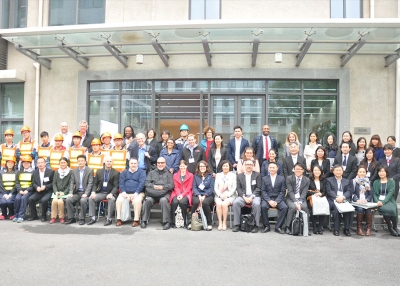How Being Part of a Global Network Transformed Denver Schools
Denver Public Schools has been a member of the Center for Global Education at Asia Society's Global Cities Education Network since 2012. The Global Cities Education Network (GCEN) is an international learning network of cities across North America and the Asia-Pacific region. Below, Denver Public Schools Superintendent Tom Boasberg shares some of the lessons Denver has learned and implemented from school systems around the world.
By Tom Boasberg
January 2, 2018
One of the most powerful forces that can drive a community is a shared commitment to educating all children equitably and effectively. As a school district leader, I lead Denver's pledge to provide an equitable education for our students, and as a parent, I am deeply engaged in holding the district and our community accountable. I have witnessed a similar promise to deliver equitable education in China; Australia; Argentina; Washington, DC; Singapore; and many other places around the world. Our common commitment to the student is a binding factor that can be observed in communities across the globe.
When Denver Public Schools (DPS) considers how to improve and refine learning, we collaborate not just with districts and education organizations in the US, but we also look beyond our borders to the highest performing education systems in the world. We do this despite the differences in our various cultures and backgrounds. Like professionals in any other occupation, we look to the best in the field to understand consistently high-quality practice and then learn and adapt these practices to our local context. Through our long membership in Asia Society's Global Cities Education Network, DPS engages in rich learning experiences with education leaders globally. These engagements have influenced the way we think about learning and education systems, and, informed by our global colleagues and their effective practices, we've gone through two structural changes with a third underway right now:
- School choice and school autonomy: DPS has pioneered a school-choice model, moving from a monopoly to choice, flexibility, and differentiation. With traditional schools, innovation schools, and charter schools, DPS provides parents and students with options while providing schools the same access to resources and holding them accountable to the same obligations. Strong relationships including a charter-district compact ensure collaboration on enrollment and transparency for students and parents. International learning has shown that close collaboration, public accountability, and involvement from the public school system is critical in school choice. Many countries and districts work to provide authentic, meaningful choice to parents and students while maintaining quality. In DPS we have been influenced by Hong Kong's work in this area and their emphasis on school choice and autonomy while maintaining high quality.
- Focus on people: DPS has a continual emphasis on how to attract, develop, and keep the best educators. A cornerstone of this work is the Teacher Leadership & Collaboration initiative, which supports teachers in leading without leaving the classroom. With more than 500 teacher leaders, DPS has one of the largest teacher leadership programs in the US. Teacher leaders serve as team leads or specialists to engage in observation, feedback, and coaching, as well as facilitate teacher planning time, and mentor or support first year teachers. While the district designed the overall program, flexibility is provided to each school in how it is implemented. We are now seeing the growth of a talent pipeline as we keep teachers in the profession through new opportunities and drop in teacher attrition; we can magnify the expertise of great teachers and create strong distributed leadership teams; and develop a corps of people more prepared for principalship. This work was influenced heavily by the career ladders observed in Shanghai and Singapore, as their carefully thought-out systems expanded our thinking on the role of teacher career paths and teacher leadership. Both have highly organized and articulated teacher development systems with many diverse opportunities for growth, and they are recognized as two of the strongest teacher development systems in the world.
- Reimagine secondary school: The next frontier for DPS is to redefine the secondary school experience to combine opportunities in the academic world with meaningful, authentic opportunities in the professional world. This journey began by engaging deeply with other systems around the world to understand what they have done to provide flexible options for students for college and career, including the successful and well-developed CTE/VET systems in Hong Kong, Melbourne, Singapore, and Switzerland. The Institute of Technical Education in Singapore demonstrated to us what is possible in developing a set of interconnected pathways for youth and adult learners to acquire the skills, knowledge, and values for employability and lifelong learning in a global economy. Switzerland's apprenticeship model became the next piece in the puzzle, and in close partnership with our state-wide partners at CareerWise, DPS's CareerConnect program was launched in 2016. We are providing relevant, workplace-based learning opportunities for our students to prepare them for higher education, career, and life. We also recognize that we are early in our journey, and will continue to rely on our partners globally who are ahead of us in their thinking.
Over the past decade, DPS has grown by 26 percent, increased the number of graduates by 61 percent, and decreased the dropout rate by 60 percent. We are making progress while knowing we still have considerable gaps in our achievement and much to learn. Being a part of diverse group of school systems committed to improving educational practice has improved DPS; like many educators, we get better by learning with others. Being a part of a global network has brought a different lens to the learning, often introducing new ideas and shifts in mindset that occur when the familiar context is removed. Our goal as a system is to keep learning and growing with the world to develop the best opportunities for students in Denver.
A version of this article originally appeared on Education Week's Global Learning blog.
Learn More
The Global Cities Education Network is an international learning community of city school systems in Asia and North America. Learn more
Connect With Us
Asia Society
725 Park Avenue
New York, NY 10021
t: 212-327-9260
[email protected]




